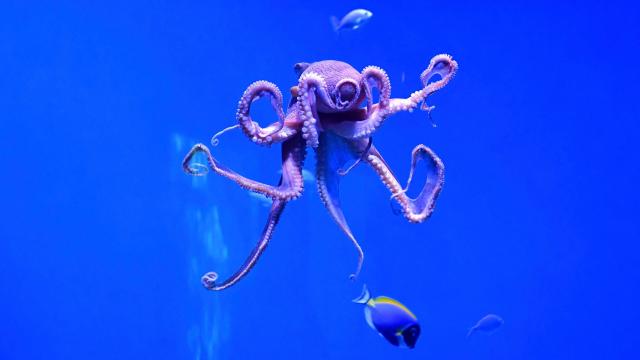Marine invertebrates like octopuses, squids, shrimp, and crayfish are capable of feeling pain, hunger, joy, and excitement, among other expressions of sentience. The U.K. government will now update its new animal welfare bill accordingly.
In May, the U.K. government introduced its Animal Welfare (Sentience) Bill, in which it recognised vertebrates (animals with backbones) as sentient beings. Seeing the legislation as incomplete, the government “commissioned research into the sentience of decapod crustaceans and cephalopods, and in light of these future findings,” it would “consider further protections,” according to the accompanying Action Plan for Animal Welfare.
This was a smart decision, as invertebrates are typically viewed as being “lower” animals in comparison to vertebrates, which isn’t really fair. Octopuses, for example, are known for their astounding problem-solving abilities and inquisitive, even playful, natures.
This review, handled by the London School of Economics and Political Science, is now complete, with a panel of experts concluding that cephalopods, a group that includes lobsters, crabs, shrimp, prawns, crayfish, and decapods, a group that includes octopuses, squids, and cuttlefish, have “complex central nervous systems, one of the key hallmarks of sentience,” and that they’re subsequently capable of experiencing “feelings of pain, pleasure, hunger, thirst, warmth, joy, comfort, and excitement.”
The review, led by Jonathan Birch, a professor at LSE’s Centre for Philosophy of Natural and Social Science, drew upon 300 existing scientific studies. The team considered eight different criteria for sentience, including the presence of pain receptors and integrative brain regions, the capacity for associative learning (as opposed to habituation and sensitization), and “flexible self-protective tactics used in response to injury and threat,” as Nicola Clayton, a professor of comparative cognition at the University of Cambridge, wrote in the foreword to the new review.
Equipped with these findings, the UK government says it will now amend the animal welfare bill accordingly. In a press release, animal welfare minister Lord Zac Goldsmith said the updated bill “provides a crucial assurance that animal wellbeing is rightly considered when developing new laws,” and because the “science is now clear that decapods and cephalopods can feel pain…it is only right they are covered by this vital piece of legislation.”
Birch said the updated bill will help to fix an important discrepancy. In the U.K., protections for cephalopods have already existed in the science world but “have not received any protection outside science until now,” as he explained in the LSE press release. To which he added: “One way the UK can lead on animal welfare is by protecting these invertebrate animals that humans have often completely disregarded.”
The full impact of the newly updated bill is not yet known, but it means these marine invertebrates could eventually be covered by stronger legal protections. And indeed, Birch and his colleagues evaluated several abusive commercial practices related to these creatures, recommending against declawing, nicking (cutting the tendon of a crab’s claw), eyestalk ablation (eyestalks of female shrimp are sometimes severed to accelerate breeding), the sale of live decapods to untrained handlers, and the extreme practice of boiling lobsters alive without electrical stunning.
According to the U.K. government, however, the announcement that cephalopods and decapods are sentient beings “will not affect any existing legislation or industry practices such as fishing,” and there “will be no direct impact on the shellfish catching or restaurant industry.” Rather, the resulting amendment will make sure that “animal welfare is well considered in future decision-making.”
That is obviously hugely disappointing, and I have to wonder why they even bothered. Good press? An appeal to voters? An attempt to look progressive? Maybe. Still, it’s a step in the right direction, despite this step being achingly slow. Hoping the “future decision-making” of which the UK government speaks happens soon and that these marine animals get the protections they deserve.
More: The UK’s New Animal Welfare Plan Is Both Very Good and Not Nearly Enough.
